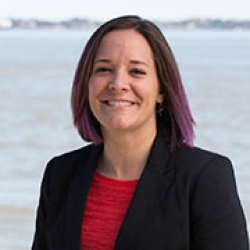
Michelle Jungbluth
Biography
I am a biological oceanographer, marine ecologist, and molecular biologist. My research primarily focuses on studies of lower trophic level food web connections, community diversity in restoring wetlands, and population dynamics and distributions of aquatic species in marine and estuarine environments. Much of my work is field-based, utilizes boats or research vessels, and involves the collection of water, zooplankton, and/or fish, along with measurements of their physical environment. The data we collect is used to assess for any indicators of changes in ecosystem health and to characterize community interactions that might be important for disentangling variability in populations observed on longer timescales.
In my lab, we primarily train our team members to apply advanced molecular techniques like environmental DNA, DNA barcoding, community DNA metabarcoding, and dietary DNA analysis using high throughput DNA sequencing and quantitative PCR to gain a high level of detail on who the important players are and what they might be doing in the environment.
Much of my work is also done in collaboration with other researchers to help contextualize my studies and facilitate making the work more interdisciplinary and impactful; my research intersects with that of Dr. Wim Kimmerer and as a team we co-run the “Zooplankton Lab” at the EOS Center. Examples of other recent collaborations include studying manta ray distribution in nearshore Hawaii using environmental DNA with Dr. Karen Crow and studying juvenile sevengill shark diets using dietary DNA metabarcoding with UC Davis graduate student Meghan Holst.
Selected publications
- Jungbluth, M. J., Hanson, K. M., Lenz, P. H., Robinson, H. E. & Goetze, E. Species-specific biomass estimation from gene copy number in metazoan plankton. Limnology and Oceanography: Methods 20, 305–319 (2022).
- Jungbluth, M. et al. Production of the copepod Pseudodiaptomus forbesi is not enhanced by ingestion of the diatom Aulacoseira granulata during a bloom. Estuaries and Coasts 44, 1083–1099 (2021).
- Jungbluth, M. J. et al. Feeding habits and novel prey of larval fishes in the northern San Francisco Estuary. Environmental DNA 3, 1059–1080 (2021).
- Kersten, O., Vetter, E. W., Jungbluth, M. J., Smith, C. R. & Goetze, E. Larval assemblages over the abyssal plain in the Pacific are highly diverse and spatially patchy. PeerJ 7:e7691, 36 (2019).
- Selph, K., Goetze, E., Jungbluth, M., Lenz, P. & Kolker, G. Microbial food web connections and rates in a subtropical embayment. Marine Ecology Progress Series 590, 19–34 (2018).
- Millette, N. C., Grosse, J., Johnson, W. M., Jungbluth, M. J. & Suter, E. A. Hidden in plain sight: The importance of cryptic interactions in marine plankton. Limnology and Oceanography Letters 3, 341–356 (2018).
- Jungbluth, M. J., Selph, K. E., Lenz, P. H. & Goetze, E. Species-specific grazing and significant trophic impacts by two species of copepod nauplii, Parvocalanus crassirostris and Bestiolina similis. Mar Ecol Prog Ser 572, 57–76 (2017).
- Jungbluth, M. J., Selph, K. E., Lenz, P. H. & Goetze, E. Incubation duration effects on copepod naupliar grazing estimates. J Exp Mar Biol Ecol 494, 54–62 (2017).
- Roncalli, V., Jungbluth, M. J. & Lenz, P. H. Glutathione S-transferase regulation in Calanus finmarchicus feeding on the toxic dinoflagellate Alexandrium fundyense. PLoS ONE 11, e0159563 (2016).
- Jungbluth, M. J. & Lenz, P. H. Copepod diversity in a subtropical bay based on a fragment of the mitochondrial COI gene. J Plankton Res 35, 630–643 (2013).
- Jungbluth, M. J., Goetze, E. & Lenz, P. H. Measuring copepod naupliar abundance in a subtropical bay using quantitative PCR. Mar Biol 160, 3125–3141 (2013).
- Goetze, E. & Jungbluth, M. J. Acetone preservation for zooplankton molecular studies. J Plankton Res 35, 972–981 (2013).